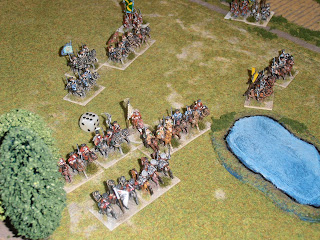Planning the new season’s
campaign from his winter quarters in Lower Alsace, Friedrich Wilhelm, Kurfürst
von Brandenburg leading the Imperial coalition needed to distract Turenne from
his real intentions, the bridging of the Rhine at a new location to bring
fresh troops across. A quick feint at one of the French magazines in Upper
Alsace would do to draw Turenne away from the Imperial crossing.
Both sides for this
engagement had 25 elements of near equal composition, but the command structure
differed considerably. In an effort to demonstrate command quality of Turenne, he
is assisted by two generals to face Bournonville accompanied by one. By adding
one more general to the French side the extra die would add flexibility and
rapidity of movement that Turenne was noted for.
The French troops.
Right Wing, Turenne (CinC)
2 x Cuirassier
6 x Cavalry
Centre,
4 x Line Infantry w/pike
4 x Conscript w/pike
1 x Heavy Artillery
Left Wing, François
Marquis de Créquy (second in command)
2 x Cuirassier
4 x Cavalry
2 x Light Horse
Note: Demoralization for
each command is set at 3 for the right wing, 3 for the left and 2 for the
centre.
The Imperial troops.
Left Wing, Alexander Herzog von Bournonville
(CinC)
8 x Cavalry
4 x Line Infantry w/pike
1 x Heavy Artillery
Right Wing, Markgraf
Hermann von Baden
2 x Cuirassiers
2 x early Dragoons
2 x Light Horse
2 x Enfant Perdus
4 x Line Infantry w/pike
Note: Demoralization for
each command is set at 4.
The Battlefield.
The area between the Vosges
Mountains the Rhine is relatively flat and dotted with fields and woods. The
landscape is further laced with tributaries wending their way toward the Rhine.
Turenne meets Bournonville at an open area between tributaries but with the
Rhine clearly in view.
Battle.
In the photo, the French are
on the left with its infantry command taking a central position and the cavalry
deployed on both flanks. The Imperial troops form up with an identical
deployment, each commander placing their infantry battalions in line facing the
French foot.
The French as defender
move first and on the second turn cross swords with the Imperial horse.
Turenne, always the firebrand in such situations personally leads a unit of
French cavalry and has the honour of dealing the “Germans” their first loss.
The supporting cavalry have a different experience but are able to reform (all
3 recoiled) alongside the battalions of foot.
The Imperial formations
were having a difficult time getting off the mark. In two bounds, the Dragoons
supported by skirmishers reached the enclosures in time to meet French cavalry.
During bound four, the
French Horse under Turenne’s presence dealt the final blow to bring the
Imperial left wing to its knees. Those Imperial cavalry not able to hold their
position are fleeing.
In that same period of
time, the French cavalry on the left had dispatched both Dragoon units and one
skirmisher. Another unit followed on the subsequent bound to send the Imperial
forces off the field.
Seen here are French
cavalry in pursuit of the Imperial cavalry and Bournonville. The Imperial foot,
demoralized and facing oncoming French foot and returning French cavalry would
lay down arms and surrender knowing that they would be exchanged later in the
campaign season.
Epilogue
This was a brisk game
which after setup took about 45 minutes to play. A small portion of infantry did
see action with the French losing a unit. The use of a third die for the French
worked well as Turenne was able to sustain the initiative pretty much on both
flanks. For the Imperial troops, one die for twelve elements is standard;
however, as the French were able to vent their fury on both flanks, both
Imperial commanders were hard pressed to maintain an effective defense.









2 opmerkingen:
Absolutely stunning looking game! Brilliant post! Could you tell me which rules you are using???
Mike
despertaferres.wordpress.com
Found the rules! Sorry to bother you!!!
Great blog!!!
Redcaer1690
Een reactie posten